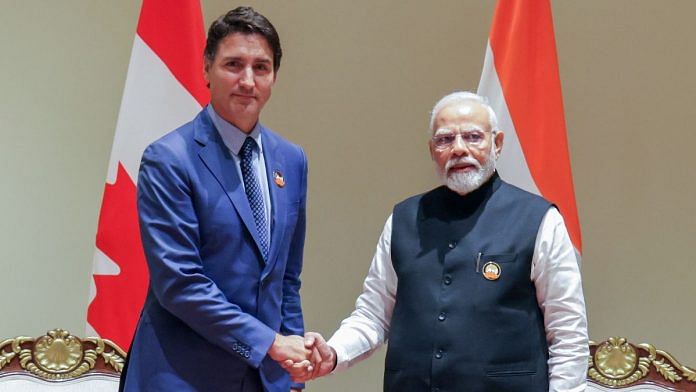Besides all the spectacle at the recently held G20 Summit, there was an actual drama going on behind the scenes. With the sensational accusation levelled against India by Canadian Prime Minister Justin Trudeau, it seems now that the curtains have been raised. Trudeau, in his hubris and immaturity, has put India-Canada bilateral relations in total jeopardy. His policy of appeasing radical Sikh vote banks has been a headache for India since he assumed office in 2015. However, reports that it was the shared intelligence of Five Eyes countries that helped Canada accuse India of killing Khalistani leader Hardeep Singh Nijjar, along with US national security advisor Jake Sullivan’s statement that India gets “no special exemption”, suggests there is more than meets the eye.
The dominant narrative to explain this standoff is the Trudeau government’s dependence on Jagmeet Singh’s New Democratic Party, which is sympathetic to the Khalistan movement. However, exclusive focus on Canada’s internal politics or Trudeau’s immaturity is not to see the woods for the trees. India has a long-standing track record of not indulging in political assassinations and has categorically denied Canada’s accusation. Considering this, the Western moral posture of attacking India on these allegations is hypocritical, especially given its long record of carrying out assassinations on foreign soil in the name of fighting terrorism. The killings of Qasem Solemani, Mulla Akhtar Mansour and Osama Bin Laden by the US are the most glaring examples.
Western hypocrisy
India should place this whole episode in the larger framework of a duplicitous game played by the West for a long time. On the one hand, we have the Western rhetoric of a value-based natural partnership with India; on the other hand, there is a systematic undermining of India through tacit support to secessionist elements and fringe groups.
Canada, which has no qualms in supporting the killing of Ayman al-Zawahiri without following due process, has turned a blind eye to repeated requests from India to rein in Khalistani extremism. The continuous Western diatribe on India on the issue of media freedom rings hollow when the Russian TV channel RT was blocked in light of the Ukraine war.
Any value-based partnership is void of substance when there is no appreciation of India’s sensibility on the issue of its territorial integrity and sovereignty. Resolutions and discussions in the European Parliament on the issue of Manipur, Kashmir, and debate in the British Parliament on purely domestic issues like farm laws suggest a deliberate strategy of using civil liberties as a pretext to interfere in the domestic affairs of a sovereign country.
In a post-colonial society like India, this moral posturing evokes a strong response. Especially when the collective West is instrumental in creating havoc in the Middle East and North Africa (MENA) region through regime change operations. The patronising attitude of Western media, civil society, and institutions like the United States Commission on International Religious Freedom on internal issues of India like minority rights and religious freedom shows that the West is yet to shake off its ‘colonial hangover’ and accept India as an independent, sovereign, and democratic country.
Also Read: 5 Eyes hold the secrets behind Trudeau’s charges. India must worry about its vulnerabilities
Quest for multipolarity
From an Indian perspective, our aspiration of a multipolar world is fundamentally at odds with the Western quest of retaining the status quo through the euphemism of “rule-based order”. From a collective Western perspective, a multipolar world is the worst possible outcome among the present alternatives of a dying unipolarity, emerging bipolarity and incipient multipolarity. This is reflected in India’s strategic dilemma regarding BRICS, SCO, and QUAD.
Currently, India under its policy of “strategic autonomy” has placed its foot on both sides of the door but this policy has its limitations. On the one hand, we have the eastern bloc dominated by countries like China, Russia, and Iran without the moral posturing on issues of human rights, and on the other, we have a tactical alliance with the West, which comes with strings attached.
One of the defining features of “rule-based order” is that it is determined by Anglo-Saxon countries. Will India, with its distinct civilisation and national aspiration shaped by its anti-colonial freedom struggle, ever be able to join the club? In this episode, the US inclination towards a G7 country rather than its QUAD partner should serve as a reminder.
The real question we need to ask ourselves is whether our quest for a multipolar democratic world is better served through a euphemistic alliance with the West or by strengthening the revisionism of the Eastern bloc. There are no easy answers but it is this question that defines India’s place at the global high table.
(Edited by Theres Sudeep)



